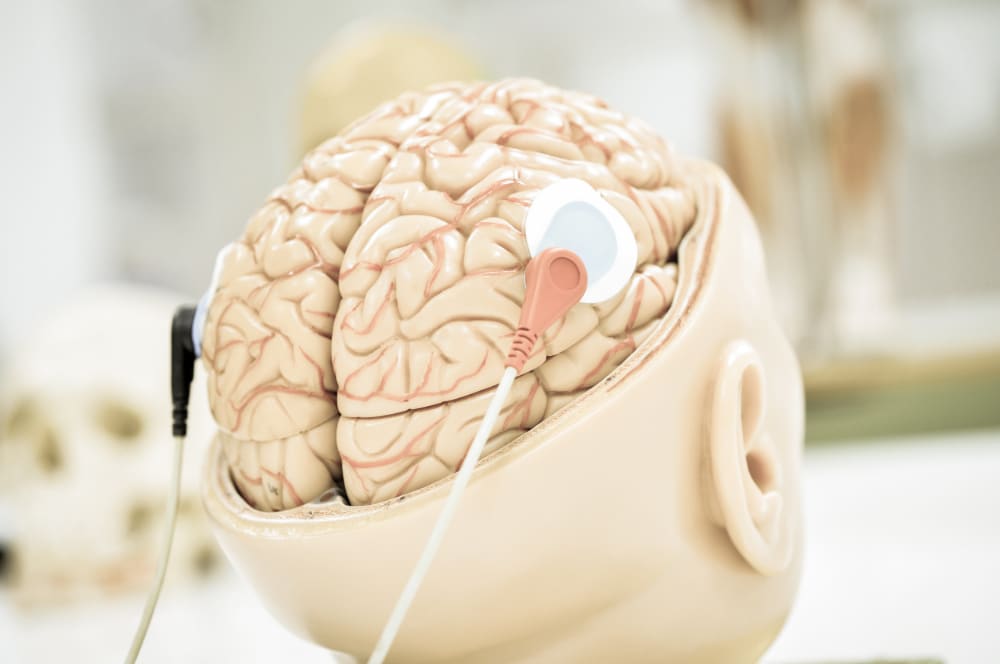Deep Brain Stimulation for Addiction Treatment

In a story that sounds like science fiction but is serious research, a team of doctors in London are embarking on a trial of brain implants for the treatment of opioid addiction and alcohol addiction.
The research is being led by a Dr. Valerie Voon, Professor of Neuropsychiatry and Neuromodulation in the Department of Psychiatry at the University of Cambridge in London. Dr. Voon leads the Interventional Neuropsychiatry Group which “is anchored on understanding mechanisms underlying human self-control and compulsivity and the influence of emotion and incentives. We focus on disorders of addictions and compulsive disorders,” says the group’s website.
In particular, her research covers “invasive and non-invasive neuromodulation,” including the use of deep brain stimulation to reduce cravings for alcohol and opioids. The upcoming trial, which has its own branding — Brain-PACER — and website — involves implanting slender electrodes in precise locations in the brain.
These electrodes are stimulated by a pulse generator implanted in the chest. However, researchers are able to randomize the use or non-use of stimulation to better understand its effectiveness in reducing cravings. The Brain-PACER website says it “acts as a brain pacemaker to normalise abnormal brain activity.”
The trial will involve 12 adults, six in treatment for alcohol use disorder for more than five years, and six in treatment for opioid use disorder for more than five years. The trial will take place at two facilities, Addenbrooke’s Hospital in Cambridge and King’s College Hospital in London.
Deep brain stimulation has been approved by the Food and Drug Administration (FDA) for neurological disorders since 1997. The procedure has been determined “effective” and “well tolerated” in the treatment of Parkinson’s disease and obsessive-compulsive disorder (OCD). The Brain-PACER trial targets the following areas of the brain:
- The nucleus accumbens. Brain-PACER hopes to reduce urges by targeting this area of the brain which is involved in dopamine signaling.
- The ventral internal capsule. Brain-PACER hopes to strengthen impulse control and improve decision making by targeting this area of the brain.
The Brain-PACER website says that the procedure “is reversible and adjustable,” noting that the pulse generator can be wirelessly adjusted. The website gives no indication of the duration of the trial for each patient.
Similar to the way people taking GLP-1 drugs for diabetes and obesity report a reduction in cravings for alcohol and opioids, individuals receiving deep brain stimulation for neurological disorders report a reduced craving for alcohol. Building upon secondary outcomes of previous trials, Brain-PACER will be the first randomized, controlled trial of deep brain stimulation specifically for the treatment of substance use disorders.
In an article for Frontiers in Psychiatry last year, a team of researchers out of the University of Colorado School of Medicine urged caution in the use of deep brain stimulation for substance use disorders, noting it is “off-label, and trials require careful planning to address multiple population-specific concerns.” They lay out recommendations for designing trials, including the importance of “capturing long-term effects.”
How long should a trial be? “Symptom amelioration, on average, was seen within the first two weeks of stimulation” for alcohol use disorder, researchers note. However, deep brain stimulation for depression takes a minimum of six months and as long as one to two years to reach peak response rates.
The researchers also strongly encourage trails to address study termination, particularly what happens to the equipment when the trial is over. Patients are left, years later, with the decision to continue using the Brain-PACER or have it removed. As the pulse generator must be replaced every few years, the researchers recommend patients be offered continuous maintenance and be enrolled in a continuous trial.
If it works well enough, Brain-PACER may offer a new path to recovery for people who are desperate and unresponsive to either therapy or medication-assisted treatment for substance use disorders.
Written by Steve O’Keefe. First published March 20, 2025.
Sources:
“‘Brain pacemakers’: implants to be tested to help alcohol and opioid addicts,” The Guardian, March 15, 2025.
“Deep brain stimulation for the treatment of substance use disorders: a promising approach requiring caution,” Frontiers in Psychiatry, July 11, 2024.
Image Copyright: tinydevil.




